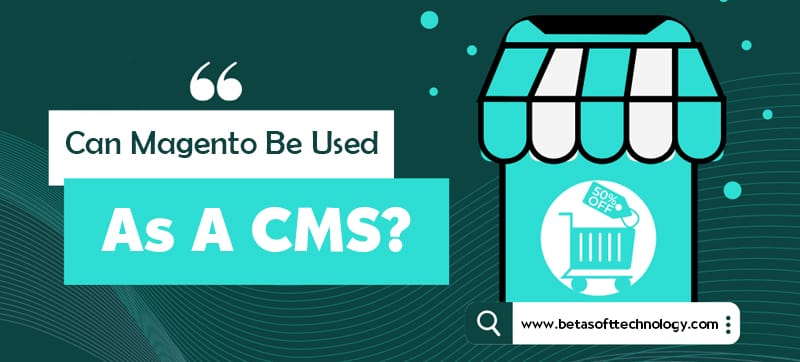Modern content management systems are frequently considered to be used to handle either a blog or an e-commerce website. But that is a typical misunderstanding.
The Magento CMS is renowned as a potent tool for creating a distinctive storefront and running online businesses of any scale and complexity. The additional advantages of Magento, such as its content management features, are frequently disregarded. You will discover how to utilize Magento as a CMS in this lesson as well as why it can be the perfect platform for creating a powerful online presence.
Is Magento a suitable CMS?
Magento CMS, which powers more than 200,000 websites globally, continues to rank in the top 10 most popular content management systems. The Magento eCommerce platform is a top choice for creating and managing online shops and marketplaces. The only open-source eCommerce software that is used more commonly is possibly WordPress, another well-liked CMS, and the plugin WooCommerce.
Using Magento for eCommerce vs. Using it as a CMS
To meet the needs of e-commerce, Magento was created. Among many other elements, this entails creating and managing a product catalog, processing orders, and storing customer data. Additionally, Magento CMS is renowned as an open-source eCommerce platform with virtually
limitless customizability.
You may build a distinctive storefront and incorporate other services, like payment gateways and analytics tools, by using a variety of extensions and custom modules. The intricacy of Magento CMS, however, goes hand in hand with its strength, as you frequently need to engage a developer or even an entire team to make your ideas a reality.
1. Build Pages with Magento
The drag-and-drop content management system was ultimately integrated into the built-in platform’s capability with the release of Magento Commerce 2.3. Only three years later, in Magento 2.4.3 and later versions, was the new Page Builder capability eventually made available to Magento Open Source users.
Although there was a tonne of page builder extensions available before Magento CMS introduced its official solution, the launch of Magento Open Source 2.4.3 marked a significant advancement towards complete site editing and, ultimately, the use of Magento as a full-fledged CMS solution.
2. Magento Versions 1 and 2
With a long history, Magento CMS has undergone numerous adjustments to become what is currently known as Magento 2. The end of life for Magento 1, which is still utilized by hundreds of business owners, was in 2020. Users of Magento 1 are urged to switch to Magento 2, which is still expanding and evolving.
Although Magento 2 might be seen as Magento 1’s successor, the two platforms are very different from one another, which made migrating between them difficult. Since its end of life, no significant changes have been made to Magento 1, which offers a very limited amount of content management features. The only Magento CMS alternative you should think about is Magento 2.
SEO-Friendly Content Management System: Magento
The extensive customizability options that make Magento CMS a powerful eCommerce platform are only the tip of the iceberg. Because of its speed and a variety of sophisticated SEO optimizations built-in, Magento is incredibly SEO friendly.
Enhanced URL structure, sitemaps, meta descriptions, and tags, as well as product ranking on all of the main search engines, including Google, are all aspects of the Magento CMS.
Page load speed and website performance are becoming significant ranking considerations. If there are no restrictions imposed by the hosting provider, all delays in providing material to the end user have been virtually eliminated due to the numerous updates made with each new Magento CMS version.
All eCommerce platforms have a serious concern for quick query processing. By making Elasticsearch its primary search engine, Magento CMS makes sure of it. On e-commerce websites, Elasticsearch performs significantly better than MySQL/MariaDB due to its lightning-fast speed and perfect relevancy of search results.
Bottom line: Using Magento as a CMS
It is impossible to exaggerate the value of organic content in e-commerce for boosting engagement and raising brand awareness. One of the top content management systems for operating an online business, Magento has seen significant modifications in the past few years as a potent eCommerce platform.
Therefore, it is a Magento CMS. Definitely! Magento can accommodate a wide range of needs for business owners because of its high customizability capabilities and vast selection of content management choices.
In order to ensure that both small and large enterprises can operate online no matter what, Beta Soft Technology is proud to power thousands of Magento-powered websites. By utilizing Beta Soft Technology’s managed open-source eCommerce platform, you may strengthen and grow your online presence.






